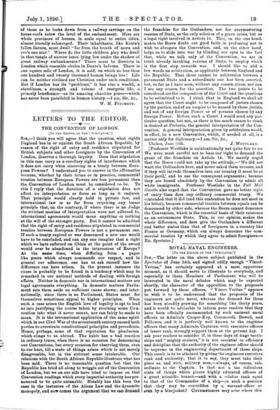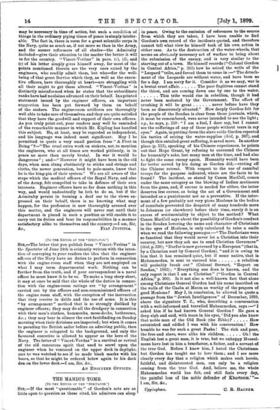ROYAL NAVAL ENGINEERS.
[To THE EDITOR OF THE "SPECTATOR."] SIR,—The letter on the above subject published in the Spectator of June 24th, and signed oddly enough "Vincet- Veritas," has certainly appeared at a most opportune moment, as it should serve to illustrate to everybody, and especially to those Members of Parliament who will be interested in the naval debates which may be expected shortly, the character of the opposition to the proposals put forward by these officers. " Vincet-Veritas " appears to wish it to be understood that the proposals of the engineers are quite novel, whereas the demand for them has been steadily growing for something like thirty years, and it would be advisable to inform your readers that they have been officially recommended by such eminent naval officers as Admirals Cooper-Key, Commerell, Dowell, and Fellowes, and it is perfectly well known to the engineer officers that many Admirals, Captains, with executive officers of lesser rank, strongly support them at the present day. I ask your readers to consider if, in these days of huge battle- ships and "mighty cruisers," it is not essential to efficiency and discipline that the authority of the engineer officer should be supreme in the engineering department of those ships. This result is to be attained by giving the engineers executive rank and authority; that is to say, they must take their place as, and with, military men,—always, of course, sub- ordinate to the Captain. Is that not a too ridiculous state of things which places highly educated officers of a great, scientific branch—and with a relative rank equal to that of the Commander of a ship—in such a position that they may be overridden by a warrant-officer or even by a bluejacket? Circumetances may arise where this may be necessary in time of action, but such a condition of things in the ordinary piping times of peace is simply intoler- able. The fact is, there is room for a great scientific corps in the Navy, quite as much as, if not more so than in the Army, and the sooner reformers of all shades—the Admiralty included—give their attention to the matter the better it will De for the country. " Vincet-Veritas" in pars. (c), (d), and (e) of his letter simply gives himself away, for most of the points mentioned therein are the very ones raised by the engineers, who readily admit them, but who—for the well- being of that great Service which they, as well as the execu- tive officers, have thoroughly at heart—are struggling with all their might to get them altered. " Vincet-Veritas " is distinctly misinformed when he states that the subordinate ranks have had no claims advanced on their behalf. Ina printed statement issued by the engineer officers, an important suggestion has been put forward by them on behalf of the stokers. The engine-room artificers are thoroughly well able to take care of themselves, and they are quite satisfied that they have the goodwill and support of their own officers. As you truly point out, your readers may well be reminded of the remarkable manner in which Mr. Kipling has handled this subject. He, at least, may be regarded as independent, and his language was indeed most significant. May I be permitted to quote a very small portion from "A Fleet in Being "?—" The cruel extra work on stokers, not,to mention the engineers, who at all times are worked pitilessly, is in peace no more than merely brutal. In war it would be dangerous" ; and—" However it might have been in the old days, when men clung obstinately to sticks and strings and cloths, the newer generation, bred to pole-masts, know that he is the king-pin of their system." We are all aware of the steps which the medical officers of the Royal Navy, and also of the Army, felt compelled to take in defence of their own interests. Engineer officers have so far done nothing in this way, and would undoubtedly be loth to do so, bat if the Admiralty persist in turning a deaf ear to the views ex- pressed on their behalf, there is no knowing what may happen, for the profession is now thoroughly aroused over this matter, and the engineers will never rest until their department is placed in such a position as will enable it to carry out its duties and bear its responsibilities in a manner satisfactory alike to themselves and the country.—I am, Sir,
FIAT JIISTITIA.
















































 Previous page
Previous page